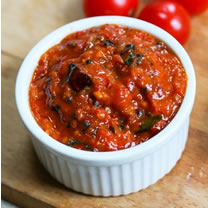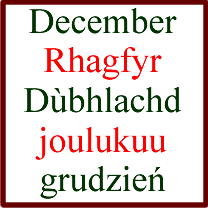
Here are some recordings of Christmas greetings in various languages.
Do you know which languages they are?

Here are some recordings of Christmas greetings in various languages.
Do you know which languages they are?

When looking for the French word for chutney last night we discovered the word aigre (sour), and realised that vinegar, or vinaigre in French, must be wine (vin) that is sour (aigre). This is indeed the origin of vinegar and vinaigre.
Vin (wine) comes from the Latin vīnum (wine, grapes, grapevine), from Proto-Italic *wīnom (wine), from Proto-Indo-European *wóyh₁nom (wine).
Aigre (sour, sharp, acid, shrill) comes from the Old French, from Vulgar Latin *acrus / *acrum, from the Classical Latin acer / acrem (sharp, sour, bitter), from Proto-Italic *akris (sharp, sour), from Proto-Indo-European *h₂ḱrós (sharp).
Chutney is a sauce made from fruit and/or vegetables preserved with vinegar and sugar. The word comes from the Hindi चटनी (catnī / chatnee – to lick). In French it is chutney, épice or salade piquante, and is defined as “condiment aigre-doux” (bittersweet condiment), which is where I found the word aigre.
Recently I learnt the Swedish word genomsnitt [jèːnɔmˌsnɪt], which means average or approximately. I thought I’d write about it as I like the way it sounds.
It comes genom (though, across) and snitt (a cut, an average). Genom comes from the Old Norse gegn (through), and snitt comes from the Proto-Germanic *snit (cutting, pruning, harversting).
Genom also appears in other words, including:
Genom also means genome.
Snitt also means dainty sandwich, fashion, incision, cut, section.
Related words, and other words containing snitt include:
Sources: bab.la, Wiktionary

Here’s a recording in a mystery language.
Can you identify the language, and do you know where it’s spoken?

In many languages this month is known as December, or something similar, which comes ultimately from the Latin *decumo-mēnsris (of the tenth month) – the Roman calendar started in March (mārtius) [source].
However in some languages December has a completely different name:
In Welsh December is Rhagfyr [ˈr̥aɡvɨ̞r], which means the ‘foreshortening’, from rhagfyrhau (to foreshorten), from rhag (a prefix with various meanings) and byr (short, small) [source].
In Breton December is miz Kerzu [miz ˈkɛʁ.zy] – which means ‘very dark month’. The Cornish for December is similar and has the same meaning: Mys Kevardhu [source].
In Scottish Gaelic December is Dùbhlachd, From dubh (dark), so it’s a dark time [source].
In Irish December is Mí na Nollag (the month of Christmas). Nollag is the genetive of Nollaig, which comes from the Old Irish Notlaic (Christmas), from Latin nātālīcia (a birthday party), from nātālis (natal), from nātus (born) [source].
In Finnish December is joulukuu (Christmas/yule moon) [source], which was also the meaning of the Old English word for this month: Gēolmōnaþ.
In Czech December is prosinec [prɔsɪnɛt͡s], which comes from prosinoti (flashing, shining) [source].
In Polish December is grudzień [ˈɡru.d͡ʑɛɲ], from the Proto-Slavic *grudьnъ, from *gruda (heap, lump) & *-ьnъ [source].
Are there interesting names for December in other languages?
In one of the songs we sang at the Welsh session last night, there’s an interesting word – hatling, which means ‘mite, half-farthing; modest contribution, all that a poor person can afford’.
It’s a word I haven’t come across before, but from the context I guessed it was term of affection. This is how it’s used:
Fy hatling offrymaf dros enaid dan glo,
Fy nghanwyll offrymaf yn eglwys y fro,
’R offeren weddïaf saith seithwaith yn daer
Er cadw ei enaid anfarwol.
Myn Mair, Myn Mair
Which means:
My penn’orth I’ll offer for a soul in prison,
My candle I’ll offer in the church in the vale,
The Mass I’ll pray earnestly, seven times seven,
To save his immortal soul.
O Mary, O Mary.
You can hear the whole song here:
So it seems it doesn’t mean what I thought. I can’t find any information about its origin, but my guess is that it’s a perhaps a nickname for a half-farthing. This is a coin that was first minted in Ceylon (now Sri Lanka) in 1828, and used in the UK from 1842. It was worth an eighth of a penny.
Some other nicknames and abbreviations for British coins include:
– Bender = a sixpence, known as such because it could be bent, due to its silver content. A one time you could get very drunk for a sixpence, which is the origin of the phrase ‘to go on a bender’.
– Bob = a shilling. Possibly related to bell ringing, as a bob can also be a tune played on church bells.
– Tanner = a sixpence. Possibly from the Romani word tawno (small one).
– Groat = four pence (fuppence). From the Dutch word groot (great).
– Ha’penny = half penny
– Tuppence = two pence
– Thruppence or Thruppenny bit = three pence
– Quid = £1
– Beer token = £2 (a pint of beer cost about £2 when this coin was introduced in 1998).
Only the £1 and £2 coins are still used.
Do you know of any other interesting nicknames for coins or bank notes?
Sources: Geiriadur Prifysgol Cymru – A Dictionary of the Welsh Language, Ireland, Wales and Europe – Poems, History and Language, Royal Mint

Here’s a recording in a mystery language.
Can you identify the language, and do you know where it’s spoken?
The other day a Manx-speaking friend posted a photo on Instagram of a boat with the name Cumraig, with a note saying that it means comrade or companion:
Cumraig – comrade / companion #Manx #Gaelic #gaelg #culture #identity #isleofman
I wondered if Cumraig is related to the Welsh word Cymraeg (Welsh language), and whether the other Celtic languages have similar words.
In Manx the word cumraag means companion, comrade, fellow, mate, pal, escort – Cumraig seems to be a variant form.
Cumraag appears in phrases like:
– cumraag caggee = brother-in-arms
– cumraag marrey = shipmate
– cumraag scoill = schoolfellow
– cumraag shamyr = roommate
In Welsh there are a number of words that are probably related to cumraag, although I cannot find confirmation of this:
– Cymraeg [kəmˈraːɨ̯ɡ] = Welsh; the Welsh language; of the Welsh language; Welsh-speaking
– Cymreig [kəmˈrei̯ɡ] = Welsh; of Wales or the Welsh culture (but not of the Welsh language)
– Cymro [ˈkəm.rɔ] = Welsh person; Welshman
– Cymraes [kəmˈraːɨ̯s ] = Welshwoman
– Cymry [ˈkəm.rɨ̞] = the Welsh (people); Welshmen
– Cymru [ˈkəm.rɨ̞] = Wales
These words come from the late Proto-Brythonic *kumroɣ [kɵmˈroːɣ] (compatriot), from *kombrogos, a compound of *kom- (with) & *brogos (country).
*kombrogos is also the root of the Breton keñvroad / keñvroiz (compatriot), and of Cumbria, Cumberland, and Cambria, the Roman name for the region now known as Cymru / Wales.
Sources: Fockleyreen, Wiktionary, Encyclopedia.com, Y Ddraig
If someone said to you, “It was a good session last night”, what would you understand by that?
In my world a session involves people gathering together, usually in a pub, to play folk music, sing, and sometimes to dance and/or tell stories.
Other kinds of sessions are available: jam sessions, parliamentary sessions, training sessions, drinking sessions, recording sessions, and so on.
The word session comes from the Old French session (sitting; session [of a court or committee]), from the Latin sessiō (a sitting), from sedeō (sit), from the Proto-Italic *sedēō (sit, be sitting, be seated), from the Proto-Indo-European *sed- (to sit), which is also the root of the English word saddle [source].
I go to several folk music sessions a week, and usually play the mandolin, and occasionally the whistle, bodhrán or cavaquinho. I also go to a ukulele session. In some sessions we play Irish or Welsh music, in others we play music and sing songs from many countries. We also play tunes we have written ourselves, including some of my own tunes.
I’ve learnt many tunes from these sessions. Some I can pick up by ear after hearing them a few times, others I record and learn at home. I find it easier to learn a tune if I’ve heard it many times, though some are harder to learn than others as they are in unusual keys, and/or don’t go where you expect.
Similarly, when learning new words in foreign tongues, the ones that are easiest to learn are the ones that sound familar. Maybe I’ve heard them many times, and/or they’re similar to words I already know. Words that contain unfamiliar sounds and combinations of sounds take more learning, just as tunes in unfamiliar keys and/or containing unusual combinations of notes can take longer to learn.
Sometimes the versions of tunes I know are a bit different to the ones known by my fellow musicians. This is a bit like hearing a language spoken with a different accent, or in a different dialect – it may seem strange at first, but you get used to it the more you hear it.
Last night I went to a Welsh music session in the Globe Inn (Tafarn y Glôb) in Bangor. Here’s one of the tunes that was played (Y Derwydd – The Druid):

Here’s a recording in a mystery language.
Can you identify the language, and do you know where it’s spoken?